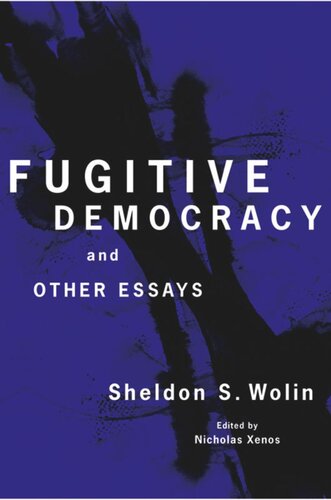

Most ebook files are in PDF format, so you can easily read them using various software such as Foxit Reader or directly on the Google Chrome browser.
Some ebook files are released by publishers in other formats such as .awz, .mobi, .epub, .fb2, etc. You may need to install specific software to read these formats on mobile/PC, such as Calibre.
Please read the tutorial at this link: https://ebookbell.com/faq
We offer FREE conversion to the popular formats you request; however, this may take some time. Therefore, right after payment, please email us, and we will try to provide the service as quickly as possible.
For some exceptional file formats or broken links (if any), please refrain from opening any disputes. Instead, email us first, and we will try to assist within a maximum of 6 hours.
EbookBell Team

4.7
26 reviewsSheldon Wolin was one of the most influential and original political thinkers of the past fifty years. Fugitive Democracy brings together his most important writings, from classic essays such as "Political Theory as a Vocation," written amid the Cold War and the conflict in Vietnam, to his late radical essays on American democracy such as “Fugitive Democracy,” in which he offers a controversial reinterpretation of democracy as an episodic phenomenon distinct from the routinized political management that passes for democracy today.
The breathtaking range of Wolin's scholarship, political commitment, and critical acumen are on full display in this authoritative and accessible collection. He critically engages a diverse range of political theorists, including Thomas Hobbes, Karl Marx, Max Weber, Hannah Arendt, John Rawls, Michel Foucault, and Richard Rorty. These essays grapple with topics such as power, modernization, the sixties, revolutionary politics, and inequality, all the while showcasing Wolin’s enduring commitment to writing civic-minded theoretical commentary on the most pressing political issues of the day. Here, Wolin laments the rise of conservatives who style themselves as revolutionary, criticizes Rawlsian liberals as abstract to the point of being apolitical, diagnoses postmodern theory as a form of acquiescence, and much more.
Fugitive Democracy offers enduring insights into many of today’s most pressing political predicaments, and introduces a whole new generation of readers to this provocative figure in contemporary political thought.